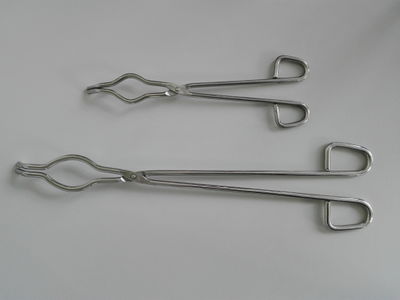Difference between revisions of "Crucible tongs"
From Sciencemadness Wiki
| Line 1: | Line 1: | ||
{{Stub}} | {{Stub}} | ||
| − | [[File:Crucible tongs 200 and 400 mm.jpg|thumb| | + | [[File:Crucible tongs 200 and 400 mm.jpg|thumb|400px|Two [[stainless steel]] crucible tongs, 200 and 400 mm in length]] |
'''Crucible tongs''' are scissor-like tools, with two pincers instead of having two blades, which allow the users to grasp a hot crucible or various flasks. | '''Crucible tongs''' are scissor-like tools, with two pincers instead of having two blades, which allow the users to grasp a hot crucible or various flasks. | ||
Revision as of 15:45, 30 April 2019
 |
This article is a stub. Please help Sciencemadness Wiki by expanding it, adding pictures, and improving existing text.
|

Two stainless steel crucible tongs, 200 and 400 mm in length
Crucible tongs are scissor-like tools, with two pincers instead of having two blades, which allow the users to grasp a hot crucible or various flasks.
Contents
General
Crucible tongs are generally made of stainless steel, or some other steel alloy for special types. They have scissors-like shape, with the "blades" having straight, curved or concave shaped pincers, each designed to hold different shaped flasks. Stainless steel crucible tongs can tolerate temperatures up to 500 °C, which is the average value for the softening point of stainless steel.
Availability
Crucible tongs can be bought from lab suppliers or online.
Alternatives
Various forceps can be used as crucible tongs.
Handling
Keep the crucible tongs away from haloacids and halogens.